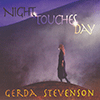
GERDA STEVENSON - Night Touches Day
Gean Records GEAN01CD
Gerda has worked for close on 30 years in stage, TV, radio and film (she’s an award-winning actor, director and playwright) and her first volume of poetry, the autobiographical If This Were Real, was published only last year. Night Touches Day would appear to be her first CD in the guise of singer-songwriter – and a most assured collection it proves. It can be seen as a natural follow-on from her poetry, which when read aloud often has a strong air of musical performance; and Gerda has precisely the right kind of expressive capability and dynamic control in her singing voice to carry this off. And for this CD she’s managed to enlist a wonderful team of approved musicians to accompany that voice: Seylan Baxter, Rob MacNeacail, James Ross, Inge Thomson, Kyrre Slind and Konrad Wiszniewski.
So far so good. And at its best, Gerda’s writing is both beguiling and gently compelling, possessing a delicate lilt that the musical arrangements satisfy very ably. I loved the catchy Auld Wumman’s Sang, with its authentic dialect mode; the mantra-like All The Prayer; the lovely lute-bedecked Aye The Gean – which coincidentally are the tracks with the most pronounced traditional feel. It’s good that the musical settings are both imaginative and comparatively spartan throughout the disc, but the sparseness doesn’t always achieve its desired effect, and to my mind James’ piano isn’t always the ideal dominant tone around which to base the songs. Hard To Say It feels right in this context, and the quite desolate It’s Ower benefits from the interpolation of an understated cello part, but on both the slow-tempo Breathe In, Breathe Out and the comforting love song I Come To You a prominent, florid sax counterpoint seems intrusive rather than enhancing. Part of the problem may be that Gerda sometimes seems to prefer to court a popular (as opposed to pop) musical idiom, which doesn’t always suit the tenor of her lyrics. It’s curious too, in view of the nature of her poetry, that some of her rhyming in the songs’ lyrics seems just a touch contrived (as opposed to just admirably clever). It’s a difficult balance to strike, between thoughtfully charming and overly-attention-grabbing or mannered – and I don’t feel that Gerda always gets it right here. But then again… perhaps the most curious thing of all is that when playing the disc through a third time, the above-noted inconsistencies and reservations largely evaporated and I thoroughly enjoyed the vast majority of the album – to the extent that I’m almost reluctant to spin the CD a fourth time for fear of reverting to initial impressions.
www.gerdastevenson.co.uk
David Kidman
| Buy
this CD online from The Listening Post The Listening Post is the CD mailorder service of The Living Tradition magazine. This album was reviewed in Issue 105 of The Living Tradition magazine. |

